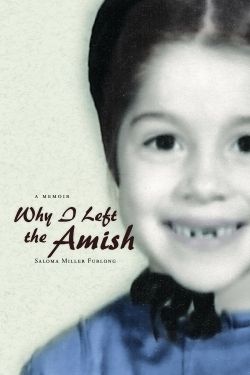Why I Left the Amish
- 2011 INDIES Finalist
- Finalist, Women's Issues (Adult Nonfiction)
Saloma Miller Furlong’s memoir unfolds over the three days she travels from her home and modern life in New England, across hundreds of miles and dozens of memories, to her father’s Ohio funeral. Against that physical and emotional framework, we encounter a woman without regret, driven by inquiry. Extended flashbacks offer full-bodied glimpses into formative years in a strict Amish community. Her struggle is to find a place in that limited social and cultural milieu, where limits are all life seems to be about.
Furlong brings to life a rural, economically borderline home life populated by seven siblings, a depressive abusive father, violent older brother, and meddling relatives. Ever present are clergy authorized to intervene in the minutiae of everyone’s lives, who nevertheless do almost nothing to alleviate the anguish and suffering in this particular family. Ultimately, the author learns her place is not in her own house, community, church, or family.
While the Amish element is central, just as palpable is the need to leave any situation as dysfunctional as hers. Occasionally veering near the victim’s voice, Furlong also moves, at times eloquently, toward compassionate understanding of her parents’ situation, emotional shortcomings, and community’s conundrums.
Indelible early lessons about the dispensable and futile nature of self-expression are clear on every page–twenty-four years after leaving, the marks of her upbringing show up in some of Furlong’s dialogue sequences. Rather than impeding, they serve as speed bumps, reminding readers that one might irrevocably leave the Amish, but the culture’s influence is ever present.
Readers thirsty for a primer on Amish life will enjoy the detail, description, and insider knowledge. Yet lurking behind customs and practices outsiders label quaint and admire for supposed simplicity are powerful forces of control, chauvinism, and cruel constraint exposed by Furlong. A reader is not surprised to learn that her four sisters also leave the Amish, effectively annihilating the family; in their world, leaving one’s church translates to rejecting the family and community, too.
Retracing her way to adulthood, the writer’s ideas coalesce, sometimes to her consternation, about who she could be on the outside. Alternating are peeks into her present life–as a mother, wife, and mid-life college student. The funeral trip allows Furlong to briefly reconnect to her Amish brethren, and some, perhaps uncharacteristically, welcome her back to visit, but not penetrate, their circle. That’s fine with Furlong. She will always be on the outside, where she belongs.
Reviewed by
Lisa Romeo
Disclosure: This article is not an endorsement, but a review. The publisher of this book provided free copies of the book to have their book reviewed by a professional reviewer. No fee was paid by the publisher for this review. Foreword Reviews only recommends books that we love. Foreword Magazine, Inc. is disclosing this in accordance with the Federal Trade Commission’s 16 CFR, Part 255.

